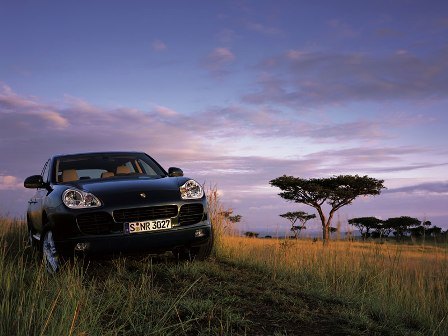The Joy of Branding or How I Learned to Love The Porsche Cayenne
One of the things I love about this site is the consistent welcome we all have to disagree with founding father, Robert Farago. He knows the truth about cars doesn’t come from pronouncements, but from productive exchange. Which is my slightly weasly way of saying: What’s with all this focus on brand dilution? Is it really the cancer of the car industry? Or, is it as misunderstood as Paris Hilton’s state of celebrity?
Robert’s contention-– shared like a bottle of Boone’s Farm with every market manager under the bridge-– is that a company’s brand is precious. Luxury car makers shouldn’t build dump trucks; sports car makers shouldn’t make minivans. That type of thing.
And it’s almost true. As Paris Hilton will tell you, the brand is the thing. She doesn’t sing or act or speak well enough to be famous for anything other than being famous. That’s her schtick and she schticks to it. Her branding-– as a famous, naughty party girl-– is so powerful she needs nothing else.
Cadillac used to be that way. Now it illustrates the danger in brand devolution. If people think you’re one thing-– a fat, luxurious car-– and you turn out to be another-– a thin sports sedan car with lots of extra leather-– you quickly become nothing. Jaguar’s spilling down-market gave us the X-Type: an OK sedan in a sea of OK sedans. Very un-Jaguar. Volkswagen’s Phaeton tried the reverse, backed out the door and left everyone asking ‘where’s the people’s car?’
Porsche teeters at a precarious point in its history. The Cayenne is simply not a sports car; it has no business sharing a bunkhouse with 911s. The more un-sporty things Porsche builds, the more it runs the risk of losing its premier sports car mantle. If that’s the brand. I think the Porsche brand is more slippery than a 962.
Porsche, the brand, is built with superb engineering. In fact, that is what it is. Superb design and execution that happens to result in some really cool cars. It also happens to result in a really cool SUV, probably a cool sedan, soon. If Porsche decided to start making tractors again, I bet they’d be cool too. Because that’s what they do – make cool things, mostly sports cars.
Porsche Design Group (a majority held subsidiary of Porsche AG) comes close to proving the point. They’ve designed, among other things, faucets, hard-drives, forklifts and subway trains. Very unsporting. The forklift should be about as far from a Carrera as you can get, except it’s not. Their forklift is cool and clever, so the whole brand earns a pass.
Honda is in the same personal watercraft. They make line trimmers and the S2000. Seriously, if Weedwacker built a $30,000 sports car could you ever be persuaded to open you checkbook? Moving from tractors to pumps to Formula One cars is quite an accomplishment, and probably couldn’t be done if Honda was known for any one of those things. They are known for competent engineering, regardless of what they engineer.
The design-engineering brand is more valuable than a manufacture’s brand. It keeps a company from being a one-trick pony carmaker. If the market for muscular rear-wheelers fades, the engineering-designer can race off in a different direction. SUVs replace eco-boxes, eco-boxes replace SUVs.
So why doesn’t every company that makes things try to position themselves as engineering-design gurus?
That won’t work for everyone, according to Wendi R W McGowan of Wendistry, branding and marketing consultants. “A brand is a believable connection with the consumer.” It is not as simple as a crusty stamp on the side of a cow. A brand is an emotional attachment between company and customer. Porsche and Honda have found one way of forging that bond. Other marks have found other ways. For example, no one buys a Ferrari because they expect it to be the most reliable car for the money.
Brand dilution, then, is not so much a disease as a vector. McGowan states. “Chevy’s not building on what they have.”
As a rusty example of old Detroit, she singles out Chevrolet. The company has the Corvette and a popular line of trucks, but fails to build on the spirit, excitement and loyalty those products have produced. Once those emotional attachments have been made, a company needs to reinforce them. Let them grow. Detroit has a tendency to push products and marketing schemes down, as opposed to letting ideas develop from grassroots.
As long as a brand maintains its connection with you, it will be healthy. A good brand isn’t selling you a product, it’s taking an invitation into your life. Kind of like this site. It wouldn’t bother me one bit if Farago added The Truth About Dryers. I’d come up with a couple of stories.
More by Michael Martineck
Latest Car Reviews
Read moreLatest Product Reviews
Read moreRecent Comments
- ToolGuy I read in TTAC that EVs are useless and dead, just sayin.
- ToolGuy I am starting to question the love for our planet expressed by the oligopolists. Have I been lied to?
- NigelShiftright My favorite color on any current car is the "McLaren orange" on Subaru Crosstreks. Unfortunately I am about four inches too tall to fit behind the wheel of one.
- Bd2 This should solve some of those awkward styling elements on the first EV6 and in doing so only 3 years into the product cycle will also be increasing it's collectible value at future Barret Jackson auctions . A youtuber I follow does expect the Kia EV6 to be among the pioneers of collectible electric cars. I recently traced my 1997 Toyota Supra Turbo for a Kia EV9.
- Redapple2 HK makes rubbish. Spend 10% more. Get 25 % better.


































Comments
Join the conversation